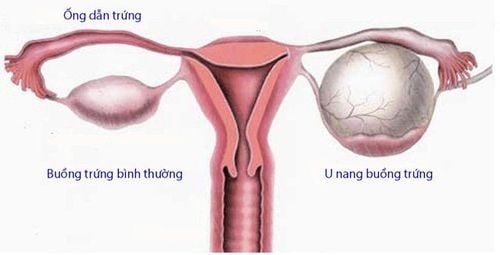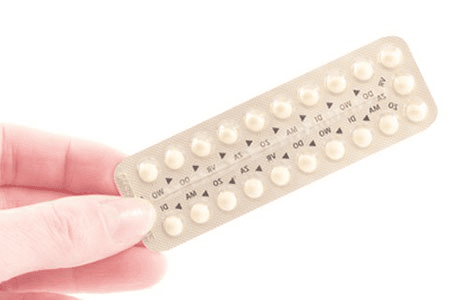This is an automatically translated article.
The article was professionally consulted by Specialist Doctor I Tran Thi Phuong Loan - Obstetrician and Gynecologist - Department of Obstetrics and Gynecology - Vinmec Phu Quoc International General HospitalOvarian cyst is a common disease in women of childbearing age. Ovarian cysts come in several forms that are completely harmless and gradually disappear.
1. Types of ovarian cysts
Some types of ovarian cysts are as follows:Functional cysts (normal, unrelated to disease). Dermis cyst. Endometrial cyst. Gland cyst.
2. Causes of Ovarian Cysts
There are many causes of ovarian cysts, the most common causes are:
Miscarriage: Women who have had a miscarriage are very susceptible to ovarian cysts. Due to having an earlier period than usual: This is also a prerequisite for ovarian cysts to develop. Due to the destruction of hormones. Due to decreased thyroid function. Possibly due to destruction of mature follicles. Endometriosis: Women with endometriosis may develop ovarian cysts. Pregnancy: Some ovarian cysts can occur spontaneously in early pregnancy to support the fetus until the placenta is formed. But sometimes cysts appear until the end of pregnancy. Pelvic infection: The foci of pelvic infection can spread to the ovaries and fallopian tubes, causing an abscess.

U nang buồng trứng có thể do nhiều nguyên nhân gây nên như sảy thai, mang thai, nhiễm trùng vùng chậu...
3. Signs to recognize ovarian cysts
Ovarian cysts often develop silently, without any symptoms. Therefore, most patients discover the disease during routine gynecological examination or during imaging tests for other reasons.
When the tumor is large, the patient may experience some of the following symptoms:
Abdominal pain occurs: The patient feels dull pain in the lower abdomen or pain in special positions. These pains are easy to confuse the patient with other gynecological diseases such as appendicitis, uterine fibroids, etc. The patient may have irregular menstrual periods. When the tumor is large, it puts pressure on neighboring organs, causing difficulty urinating or constipation,... suggestive of malignancy, immediate medical attention should be sought. Ovarian cysts can twist or rupture causing sudden pain, possibly accompanied by nausea, vomiting, and bleeding inside the abdomen. To diagnose ovarian cysts, it is necessary to do some more tests such as:
Ultrasound: This is a non-invasive imaging method, low cost but can tell the location and shape. , size, and fluid nature of ovarian cysts. This is the main criterion for the diagnosis of ovarian cysts. In addition, the doctor can look for tumor "markers" to give hints about the malignancy of the tumor. In case of need, the patient can be given magnetic resonance imaging (MRI) or computed tomography (CT scan).
4. How is ovarian cyst treated?

Theo dõi u nang buồng trứng bằng cách siêu âm rất cần thiết trong quá trình điều trị.
First need to monitor ovarian cysts:
Monitor ovarian cysts by ultrasound after menstruation to see if the tumor changes in size or nature. This should be repeated regularly, as prescribed by a specialist. With functional ovarian cysts, they usually disappear on their own after 1-2 menstrual cycles without needing treatment. So when do ovarian cysts need surgery? Ovarian cysts require surgery when:
The tumor grows rapidly. Suspected cancer. The tumor is long-lived. When there are symptoms of compression on nearby organs. Depending on the specific condition of each patient, the doctor will advise the patient to choose the appropriate surgical method: laparoscopic or open surgery, tumor removal or whole appendage or uterus, ..
There are many causes of ovarian cysts, along with that the tumor often progresses silently and without symptoms until it is large enough to affect other organs. Therefore, women need to have regular gynecological examinations to detect and promptly treat ovarian cysts or other gynecological diseases, if any.
Doctor Tran Thi Phuong Loan was former Head of Obstetrics and Gynecology Department, An Giang Central General Hospital; Doctor treating at Hoang Anh Gia Lai University of Medicine and Pharmacy Hospital before becoming an Obstetrician and Gynecologist at Vinmec Phu Quoc International General Hospital as now
Doctor has 31 years of intensive experience and strengths in the field of obstetrics and gynecology with expertise in the diagnosis and treatment of the field of obstetrics and gynecology.
Please dial HOTLINE for more information or register for an appointment HERE. Download MyVinmec app to make appointments faster and to manage your bookings easily.













